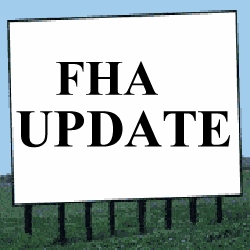
19 Oct New FHA guidelines impacting Appraisers, Agents, and Homeowners
As some may have heard and experienced recently, FHA guidelines have changed this past September. These changes will impact real estate appraisers, agents and homeowners. From an appraisal standpoint, they have modified the word “inspection” to “observation” but after reviewing the new guidelines, it looks to me that they are trying to convert appraisers into home “inspectors!”
 Here are a few FHA highlights on what’s new to appraisers
Here are a few FHA highlights on what’s new to appraisers
1) Full observation of the attic and crawl space areas (if applicable). This is a “hot” topic button among appraisers due possible health/safety issues with such an observation and/or increased potential liability. Based on what I’ve read and heard from other appraisers, since a head and shoulders view is acceptable with explanation, I believe many appraisers will still view the attic and crawl space from the access area with a head and shoulders observation. Since this full observation is a point of emphasis with FHA, there may be more ‘subject to’ inspections by a qualified professional to inspect these areas to verify condition if an appraiser observed potential damage and/or areas of concern (example: excess debris, moisture, sitting water, lack of ventilation, etc).
2) The mortgagee must provide ALL legal documents pertinent to the transaction/escrow. This could be the preliminary title report, TDS (transfer disclosure statement), etc. This again is seemingly going beyond our scope as appraisers. If an appraiser reviews such documents and finds “new” information about the subject property that is otherwise observed, the appraiser may call for a further inspection.
Along these lines, if a property is considered legal non-conforming, the appraiser must state if the subject property can be re-built as improved. A burn letter will need to be obtained, which can take days to get from the local building department and will likely have fees involved. From my experience, most lenders ask the appraisers to obtain the burn letter, but in most cases we cannot because of the fees involved, thus, falls back on the lender, agent and/or interested party to pay and obtain the letter.
3) ALL present appliances must be tested and confirmed to be operating. This goes for personal property compared to before (Example: microwave, refrigerator, washer/dryer). If these appliances are present, they are assumed to be operational and apart of the transaction.
4) The hot water heater, in addition to being double strapped, needs to have a pressure relief valve facing downward. I’ve already spoke to a few proactive real estate agents who are asking me about this component. This repair could come up more frequently during the escrow process than before.
 How can homeowners and real estate agents plan?
How can homeowners and real estate agents plan?
1) Agents need to educate their clients on these changes as escrows may be delayed and/or longer. Asking for a longer escrow from the start may be prudent to avoid asking for contract extensions.
2) Research FHA requirements and test/ make necessary repairs before your home is listed on the market and/or escrow begins. I’m always willing to help and give general advice in my conversations with agents.
3) Expect a potential increase of appraisers deferring to qualified professionals with any potential concerned observations that are beyond or scope of appraisers. After all, we are trained to be “real estate appraisers” and OUR job is estimate value. We are NOT home inspectors. There will likely be language in many appraisal reports recommending the buyer obtaining a home inspection and that the appraisal report is not to be misconstrued as any sort of home inspection report.
Summary and Thoughts?
Like it or not, these are some of the FHA changes that have been implement as of September. For a completed list of FHA changes, contact me direct. If we communicate and prepare before any potential issues arise, it will be beneficial and helpful to all of us real estate professionals. There will also be a learning curve for lenders and underwriters as well as they review FHA loans.
You may have already dealt with some of the above issues. I’d like to hear about your experiences and/or answer any questions that you may have to the best of my knowledge.
Certified Real Estate Appraiser
Office: 530-878-1688
www.AdvantageAppraisalsCa.com
Disclaimer: All information deemed reliable but not guaranteed. The information is meant entirely for educational purposes and casual reading only and is NOT intended for any other use. This information is NOT intended to support an opinion of value for your appraisal needs or any sort of value conclusion for a loan, litigation, tax appeal or other potential real estate or non real estate purpose. This appraiser is NOT a qualified home inspector and any tips are for informative purposes only. If you’d like to obtain and order an appraisal for your specific needs, please contact Bryan at 530-878-1688 for more information.




Michael Willis
Posted at 23:07h, 12 DecemberGreat write up Bryan! As a real estate professional, I can see how this will cause added delays for the appraiser, Realtor, loan process, and ultimately the borrower. I wonder how much liability the appraiser will be taking on since they will be crossing into some of things that only licensed building inspectors are qualified/licensed and insured to do. I have already seen first hand how appraisers are turning down these assignments due to the requirements and fear, or they are adjusting their fees accordingly to make up for the extra work it entails.
I like how you addressed what homeowners and agents can expect and prepare for the FHA loan process. I am happy that you have done your homework and are proactive about this big change in the FHA process!